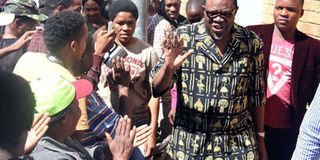Play relives Namibia fight for freedom

Namibia President Hage Geingob is cheered on by the public who lined up to cast their votes, during a past election in November 28, 2014, as he was leaving the Katutura Community Hall in Windhoek where he voted at. In the tumultuous 1980s during Namibia’s independence struggle, 400 children were shipped off to East Germany to be groomed as model communists. PHOTO | JORDAANIA ANDIMA | AFP
What you need to know:
- The young black Namibians were then pupils in a small village school in East Germany, and their maths, biology and other lessons were heavily infused with hardline communism.
WINDHOEK, Saturday
In the tumultuous 1980s during Namibia’s independence struggle, 400 children, some as young as three and many orphans, were shipped off to East Germany to be groomed as model communists and their country’s future elite — until the Berlin Wall fell.
Their forgotten odyssey, sealed in a deal between Swapo, Namibia’s Soviet-backed liberation movement, and the East German regime, is now told in a new play, Oshi-Deutsh: The GDR Children of Namibia.
Four decades later, the question remains — was it bad luck or good fortune, to be removed from families and friends, but also from war and desperate refugee camps?
“For me, it was to save my life,” said Lucia Engombe, 43, who was plucked from a camp in nearby Zambia at only six and put on a bus to the airport.
“Even as a child, I understood that.”
Flipping through the pages of an old album, Engombe pointed to yellowed photos of classmates: One now a lawyer, another an engineer, two others married and living in Europe.
The young black Namibians were then pupils in a small village school in East Germany, and their maths, biology and other lessons were heavily infused with hardline communism.
At the time, Namibia, a former German colony, was under South African occupation.
War raged between apartheid regime troops and Swapo fighters as thousands of Namibians fled to Angola and Zambia.
“I knew Zambia was not good for us because there was war,” recalled Engombe.
She would learn years later that she was severely malnourished at the time and her mother played a role in sending her away.
A PRIVILEGE
When she and other youngsters arrived in East Germany, they were set up in a castle in the village of Bellin.
Under supervision of German and Namibian teachers, they learnt German along with their political education and regular classes.
“It was intense military training,” recalled Monica Nambelela, who was taken to East Germany when she was just three.
“Swimming, fighting. You know, they said we were going to liberate our country.”
Nambelela, a government official, refuses to see herself as a victim.
“I consider myself very privileged,” she insisted.
“That education system embraced everything you needed to know in life: Hard work, punctuality, patriotism, being incorruptible.”
Oshi-Deutsh: The GDR Children of Namibia — the title is a twist on German and Oshiwambo, the most spoken language in Namibia — will be staged in Namibia and Germany.
“With our history, it’s easy to see how the play could be dark, but you really have to be able to liberate yourself and see what good came out of those years of struggle,” playwright Ndhinomholo Ndilula told AFP ahead of a performance in the capital, Windhoek.





